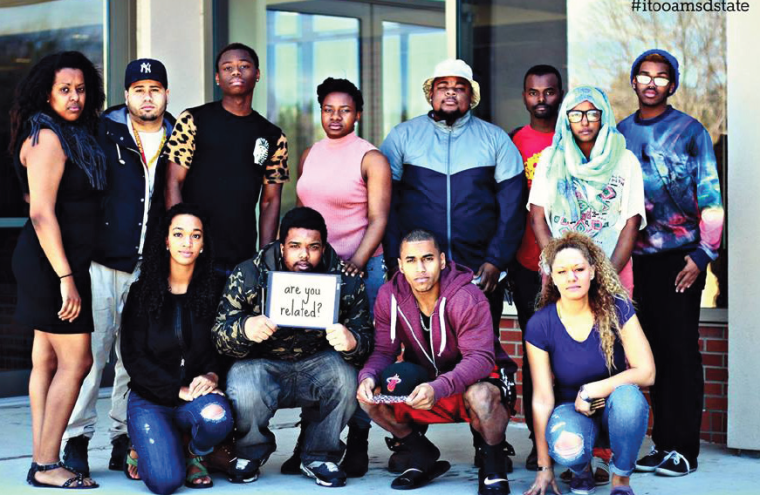#itooamsdstate
There are 15 universities, including SDSU, across the U.S. who have participated in this movement as well as a few in Austrailia and other countries.
April 23, 2014
A world-wide movement to educate people about how the things they say to others might affect their feelings has spread to SDSU. Sophomore global studies major Semehar Ghebrekidan, who coordinated the event said that the I, Too, Am SDState movement is bringing awareness to microaggressions that have been overheard on campus.
When two people meet who are of different race, background, etc. a person may ask a question that can come off as an ignorant or rude question – a microaggression. SDSU students met and talked about different microaggressions that they have encountered and then took pictures with a particular microaggression they had encountered written on a whiteboard.
“Microaggressions make people feel bad. Those comments make people question who they are which isn’t fair,” said psychology and sports management major Mikala Hora.
Ghebrekidan said the only truly negative feedback that the movement has gotten is the pictures are over edited, but the photos have not been edited at all, except to add the “#itooamsdstate” to the photo. The photographer helping with the movement is Kaylen Larson. Ghebrekidan said the only real editing Larson does is to enhance the writing in the photo or make the subject the main focus.
“It is an opportunity to share your story and to have people take interest in it … see people who genuinely care,” Hora said. “There has been criticism yeah, but it is positive that people want to know more.”
Heba Abdeljali, a psychology major, said she has gotten positive feedback on rounds as a community assistant.
Aki Ide wrote “I don’t speak Asian” as a common microaggression that he has encountered. Ide is an exchange student from Japan studying at SDSU for one year. “It was a good chance to let other students know what is rude … the project is a good chance for international students to speak up.”
There has not been much negativity toward the movement, but Ghebrekidan did receive one really negative response. A girl who messaged her repeatedly with the phrase ‘white power.’
“I don’t understand why. It is not a movement on any type of race or anything,” Ghebrekidan said.
People from USD and Iowa State have contacted Ghebrekidan wanting to do this movement. The SDSU participants have also been on KSFY and KSDJ 90.7. They have also talked to Ellen Degeneres’ production manager to see if they, and other colleges can talk on the show about the movement.
Although there was a lot of positive feedback from many participants, there were some people afraid to participate.
“It is also upsetting for people who don’t want to jump in all the way,” Ghebrekidan said. “Be an ambassador of the movement, and encompass all parts of it.”
Sanders said that she had a friend afraid of the comments that would be made in response to their participation.
“None of the comments made were horribly slanderous … the statements that were made personally offended the person, people don’t get that what they say to others really does bother them,” Sanders said.
Ghebrekidan said the movement is a good way to bring awareness to students about the little things they may say that affect people. “People are responsible for what they say,” Ghebrekidan said. “Whether they knew it before or not, it is a good way of letting them know if what they say [bothers people] or not.”
“It has helped minority-group students become closer and get to know students a little bit more,” said microbiology and pre-dentistry, junior Iman Ali.
The I, Too, Am SDState movement can be found on Facebook, Tumblr or through the hashtag #itooamsdstate.
So far, I, Too, Am SDState has had two sessions – where the photo shoots happen and students gather to have discussions. Ghebrekidan said the idea for the I, Too, Am SDState movement came when her cousin showed her the I, Too, Am Harvard.
“I took this movement into consideration and started it on campus,” Ghebrekidan said. “I am a voice on campus who speaks loudly against stereotyping of microagressions, whether they are aimed at gay, straight, black, white, female – any.” Universities all over the US from Maryland to South Dakota have participated in the movement Ghebrekidan said. Over 15 schools in the U.S. as well as some in Australia and other countries are participating in the movement.
The movement began at Harvard – a girl named Kimiko Matsuda-Lawrence, an African American and Asian student felt like she was not heard and she was ostracized. She was there onfull scholarship and did not feel the need to be subject to racism and people went so far as to ask if she could read, Ghebrekidan said.
Students participating in the movement wanted to get their message out and share their own story.
“It is nice to be heard – a way to kind of get
the message out there, it’s great to share your
own story,” said freshman advertising and sports management major Clarke Sanderson.
One student said he feels that American humor is aimed at making fun of the stereotypes of a particular race.
“I think it was good, it deals with topics people consider humorous rather than serious… American humor is ‘wow’ and the American culture thinks it is funny to make jokes about someone’s race and sexuality and stereotype races in general,” economics major Matthew Jesperson said. “It’s nice to have a light shine on an issue that people don’t really consider a major problem. How are you supposed to respond to something you can’t control?”
























